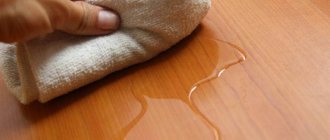The feeding behavior of domestic cats is based on the ancient instincts of their wild ancestors, ensuring their survival in the harsh conditions of the wild. That is why, when deciphering the signals given by a furry pet in “body language,” you need to turn to the behavioral stereotypes of feline predators. So why does a cat bury food? And what meaning does she put into this action?
If a Murka has eaten this or that amount of food and makes digging movements near a bowl with half-eaten contents, it means that it is, first of all, guided by the ancient instinct of a meat-eating animal after a successful hunt. It is he who tells her to hide the remains of the loot farther and deeper in order to:
Having inherited the above algorithm from their ancestors, pets can bury leftover food in a bowl for several reasons:
If a cat scratches the door, how to stop it? We analyze the reasons and solutions
Reason 1: the cat wants to eat
It happens that owners forget to feed the cat, and then they wonder why he scratches at the door. It is possible that this is how he attracts your attention and tries to remind you of the direct responsibility of a person to feed the cat delicious food every day.
Another problem could be that it's time to eat, but the door on the way to the bowl is closed . This scenario cannot be written off.
Solution:
Reason 2: the cat needs to sharpen its claws
Sharpening claws for cats is not a whim, but a necessity. To be good predators or to defend against larger predators, sharp claws are very necessary. If the door is wooden and upholstered, it can be an excellent tool for sharpening claws . Fortunately, the owners have a chance to convince the kitty otherwise. We'll tell you how to stop a cat from scratching at the door by getting it used to the scratching post.
Solution:
Reason 3: the cat is bored and seeks your attention
Imagine that you are locked up in your apartment all your life, and the toys you have, at best, are a ball and a mouse on a stick. Only no one plays mouse and ball with you, because your roommates are busy with their own important matters: they go away for half a day to work, cook something in the kitchen, watch TV or just sleep. Is it really boring? Well, how can you not stretch out to your full height and tear open the door with all your heart? After all, as soon as this happens, you will be immediately noticed and rewarded with long-awaited attention.
A similar situation can happen to your cat. He can easily lack your attention and attract it in such a unique way, which, admit it, works well.
Solution:
Reason 4: the cat wants to reclaim its territory
Now let's make another analogy. Imagine that you have your own apartment. Let's say it's a two-room apartment. And then, one fine day, someone takes and locks this room from you, and locks it. Of course, such an act will cause you indignation. Cats will have a similar reaction.
Cats are territorial animals . They strive to appropriate a certain space for themselves with the help of smells and protect it from strangers. If the door is closed, they lose access to their territory, which creates a desire to regain it. The scratching of the door is an attempt to do this.
Solution:
Why does a domestic cat attack and bite its owner?
The cat scratched its owner's hand until it bled, why?
Before weaning a cat from aggressive behavior, you need to understand why he behaves this way. Our pets are not us, and they cannot bite or scratch us for no reason.
There can be several reasons for aggression.
Pain
The animal is in pain
. One of the reasons for aggression may be illness or injury in the cat. When the owner tries to pick up his animal and it experiences pain, the pet may bite him in response. Or if the owner stepped on the cat’s paw or crushed it, it is logical that the pet, in defense, screams, hisses, and scratches.
When a cat experiences severe pain, it instinctively hides. At such moments, he can attack the owner.
If the cat was active and affectionate, and one day began to hide in a dark corner. When you try to take her out of there, she violently shows aggression. In such a situation, it is urgent to take your pet to a doctor for examination.
Fear
When a cat is afraid of something, aggression can act as a defensive reaction.
When a cat is very scared, its behavior can become aggressive. This is his quiet reaction and survival instinct.
If your children like to forcibly pet a cat or torment it, then in return they will only get vinegar and scratches. To calm your pet, you just need to move away from him what scares him.
Cats like it when their opinions are respected
. If your pet comes to you for attention, it will be sweet and affectionate. If you forcefully pet him, this will cause a lot of indignation and aggression.
Alien smell
A cat can become aggressive if it smells a strange animal.
The smell of someone else's cat or dog
. Our cats are very jealous. If the owner returns home and the smell of a foreign animal emanates from him, the cat may become aggressive. Since there is no way to fight with someone whose scent is on the owner, all the anger is directed at the owner. To avoid this, you need to immediately change clothes as soon as you return home. After this, you can wash your hands with soap or use special products that eliminate odors.
To attract attention
When your cat wants affection, she may rub against you and purr. If the owner has no time, he will simply pet the animal and then go about his business. But if the pet starts scratching or biting, this will certainly attract attention to it.
Raising your master
If you spoil your pet too much, he will create his own rules. And if you refuse to fulfill them, you will be punished with claws and teeth.
Games
Regular games
. If you allowed a small kitten to bite itself during play, then when it grows up, it will bite you in the same way. But the older the animal, the stronger its bites. In addition, during the game, even the most well-mannered cat can simply get carried away. In this case, you just need to stop him by pointing out what he is doing wrong.
These are the main reasons why a domestic cat scratches and bites its owner, but there can be many more. Each animal is individual, has its own specific tastes and habits.
What other ways are there to solve the problem?
Repellent sprays
How to stop a cat from scratching at the door if nothing helps? One of the methods is to use unpleasant odors , because cats are very sensitive to them, since they have a sensitive sense of smell.
Pet stores sell special sprays with a repellent odor . Spray the door with it, and the cat is unlikely to want to approach it. The main thing is to remember to use them regularly, as odors can dissipate.
If you want to save money, you can try making a homemade spray with a similar effect. To do this, squeeze a lemon or orange into water, pour it into a spray bottle and spray the door or the area next to it.
Cats don't like the smell of citrus fruits, you can take advantage of this
Upbringing
education , the most reliable and proven method, will help to wean it off once and for all
Praise your cat every time he uses a scratching post instead of a door. Along with praise, it doesn't hurt to give him a treat . You can use the negative reinforcement method. Threaten your cat in a stern voice when he breaks your rules. Although cats do not understand words, they sense intonation .
Road signs
The most famous sign: a cat running across the road (usually black, but generally of any color) foretells that there will be no path. Residents of Foggy Albion believe that if they are about to leave the house and hear a loud meow, it means they should postpone their journey.
If you are going to leave the house, even for a short time, you should ask the cat to protect it from uninvited guests and thieves. To do this, you need to gently stroke her and address her in your own words. Together with her brownie ally, she will fulfill the request.
If a cat purrs in response to affection, this indicates that everything will be fine, but if it meows loudly, then you should not leave the house now.
Before a long journey, people pack a bag or suitcase. If a cat climbs into it just to lie down and sleep, then the trip will be successful. If the animal tries to throw things out of the bag, you need to postpone leaving.
Sailors and fishermen always tried to take a cat on board. Initially, this was done for purely practical reasons: the cat destroyed rats - the main destroyers of food, which to remain without at sea meant certain death. Rats and mice could also damage barrels of fresh water, which was nowhere to be taken in the open sea, far from the shore. Over time, a cat on a ship began to be considered simply a good omen, and sailors always took their tailed friends on a trip. Their behavior was also used to judge the upcoming weather.
Double sided tape
A controversial method, because if the tape comes off, it will most likely stick to the cat. And if the cat is curious, he may feast on it, but the consequences may not be very good. But if you constantly monitor the cat, then the method will work.
The fact is that cats do not like sticky surfaces . If there is double-sided tape on the door, the mustachioed person is unlikely to like it. The door will remain alone, and this is what we wanted.
An alternative to double-sided tape can be a special tape Sticky Paws . It was created for naughty cats like yours.
Devices with motion detection
How to stop a cat from scratching at the door at night? A good way is to use automatic devices that will guard your sleep while the cat is awake. One of these is the Argus . The motion detector will understand when an enemy is approaching the door and will give the command to shoot compressed air . The result is capitulation. The solution is not bad, but temporary. For example, at night. During the day it will not be very convenient, since the motion detector will be triggered when you simply pass by. Another disadvantage is that the cylinders need to be changed regularly, and this is an extra item in your budget.
You can also perform the function of the device. Buy an air sprayer from a pet store and use it as directed whenever your cat damages the door. According to animal psychologists, this is one of the most humane methods.
Mr. Cat recommends: the main reasons for burying food
Experts identify several possible reasons why a cat may bury food. Among them:
- excess food (the cat tries to hide food or hide traces of its presence, obeying instinct);
- inadequate quality or unsatisfactory organoleptic characteristics of food for a particular animal (a cat may not like the taste or smell of food, on the basis of which it concludes that it is not suitable for it; this may be due to both the animal’s own preferences and the fact that the product is spoiled) ;
- foreign smell, dissatisfaction with the feeding utensil itself or its poor location;
- dirt in the feeding area (if the area under the bowl is not cleaned, and the dishes themselves are not washed for a long time, the cat will try to remove disgusting, from her point of view, odors using her own methods);
- lack of food (when a cat buries an empty bowl, it is looking for supplies);
- stressful state (being under excessive emotional stress, the cat may not have an appetite, and tries to provide itself with food for the future period when food is needed).
It is especially common to observe the burying of food in those houses where several cats live at once or where there is a dog together. The animal then tries to hide the strategic reserve from competitors.
The most dangerous reason is poor health caused by some disease. A cat may refuse food and hide it for the future if there is no appetite due to pathological processes occurring in its body.
If the cat has not previously shown a desire to bury the bowl, then it is worth carefully observing its behavior when it suddenly refuses to eat, and even digs up food. Maybe the animal needs treatment.
Cats and entrance doors. Catch Me If You Can.
Running out the door is a potentially deadly behavior.
Cats that are not used to being outdoors are at serious risk. They could be hit by a car, attacked by other animals, get lost, eat poisonous bait, or fall prey to other dangers. No matter what your cat does when she escapes the door, whether she sits on the porch or stays in the yard, she is still in danger. This behavior must be corrected.
Correcting the behavior of fugitives.
First, stop petting and rewarding your cat when you are near the door. The cat should not receive your positive attention at the door. Chances are, it's very typical for you to lean over and greet your cat as soon as you open the door. Most likely, the cat is immediately waiting for you, running under the door as soon as she hears you turn the key in the lock. Now you should organize another place for greeting after work, which will be as far from the entrance as possible. You can arrange an official place for greetings and farewells at the other end of the apartment or house. This could be a cat tree, a windowsill, a chair, anywhere your cat likes to sit. Start by luring your cat to this area. You can call her name and then reward her with a treat when she goes in the right direction. You can use a fishing rod toy for bait. If your cat loves to be petted, call her to this spot and pet her as soon as she gets there. If you use a clicker to correct your cat's behavior, you can click and reward him every time he sits in that spot. Now all your greetings and farewells should take place here. All family members, without exception, must adhere to this rule. Make sure that to reward your cat you choose a treat that is so delicious or a game that is so interesting that the pleasure is much stronger than its desire to run out the open door. Reward your cat every time she says goodbye or meets you in this place. When you open the door to your apartment at the end of the day, do not look at your cat or greet him until you are in the formal greeting and goodbye area. This is where you can hug, kiss, lavish compliments and give treats. Keep treats nearby in a container (or even save some in your pocket) so that you can reward your cat when she comes to greet you. When you leave for work in the morning and your cat is following you and looking at the door with the intention of jumping out, throw her a toy or food puzzle with her favorite treat inside at the other end of the room, a second before the door opens. The food puzzle will keep your cat entertained throughout the day.
Scare the fugitive.
If your cat still refuses to cooperate when it comes to saying goodbye and greetings in a certain place and insists on having the right to run out as soon as you open the door, then it's time for some extreme methods to help your cat understand what the front door is. nothing good happens through the door. I usually recommend simply scaring the cat the moment it jumps out the front door. Some friends of mine kept their cat away from the front door forever in an interesting way. The man put on a silicone mask of some kind of monster and hid on the stairs, and the woman pretended to go out to the store. Of course, their cat did not miss the opportunity to jump out onto the stairwell. And then the man jumped out and growled terribly! The cat fluffed up like a ball and rushed headlong back into the apartment and almost knocked down the door. After that, it was impossible to lure him even close to the door. For especially impressionable cats, you can come up with a simpler scare. Other people I know simply invited friends with a dog that barks at cats. Naturally, the dog was kept on a leash and muzzled, but the cat didn’t know about this. She, as usual, jumped out the door, intending to make her run through the floors, but a dog came out from around the corner and began to tear and bark. This exercise was repeated several times, after which the cat stopped jumping out, and now can only occasionally carefully peek out from behind the door. Generally, I do not recommend that cat owners use a spray bottle for training. There are much more effective and positive methods of training cats. But when it comes to the risk of losing your cat and the potential danger of being hit by a car or other injury, and when other training attempts have failed, a spray bottle can help. Place a spray bottle near the outside of your front door so that anyone returning home can use it. If you see your cat sitting right in front of the door and trying to get out, lean over and spray water. After you have sprayed, close the door. Don't enter the house, you don't want your cat to associate you with unpleasant feelings. You want her to think it's the door that's being so unfriendly. Then wait three minutes and then try to log in again. The above describes only a few ways to wean a cat from running out the door. Surely you can come up with many more different means and techniques, based on the preferences of each specific cat.
Source











